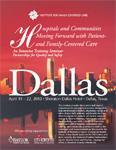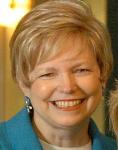| Joint Commission's New Requirements Impact Family Presence and Participation |
 The Joint Commission recently approved new and revised requirements to improve patient-provider communication applicable to the hospital accreditation program. These requirements were developed as part of a larger initiative supported by The Commonwealth Fund to increase quality and safety through effective communication, cultural competence, and patient- and family-centered care. For many patients, communication can be inhibited by language and cultural differences, or by the patient’s hearing or visual impairment, health literacy, cognitive impairment, disease, or disability. The Joint Commission recently approved new and revised requirements to improve patient-provider communication applicable to the hospital accreditation program. These requirements were developed as part of a larger initiative supported by The Commonwealth Fund to increase quality and safety through effective communication, cultural competence, and patient- and family-centered care. For many patients, communication can be inhibited by language and cultural differences, or by the patient’s hearing or visual impairment, health literacy, cognitive impairment, disease, or disability.
The new and revised elements of performance (EPs) address a variety of issues, but one in particular could have a major impact on family presence for hospitalized patients. The new Element of Performance in support of Standard RI.01.01.01 (The hospital respects, protects, and promotes patient rights) states: “The hospital allows a family member, friend, or other individual to be present with the patient for emotional support during the course of stay.” See the complete text and learn more.
Changing the concept of families as visitors and recognizing families as partners in the care of patients is critical in advancing the practice of patient- and family-centered care. The Institute for Family-Centered Care offers a variety of resources concerning family presence and participation during hospitalization. Be sure to download the FREE checklist, Are Families Considered Visitors in our Hospital or Unit. This resource presents a framework to examine staff practices and the hospital infrastructure to determine how well family presence and participation are supported. The checklist is helpful to understand current policies and practices and useful in prioritizing action steps for a plan of change.
Also check out the publication, Changing the Concept of Families as Visitors: Supporting Family Presence and Participation, which serves as a resource to assist hospitals and institutions re-envision visiting policies in favor of guidelines that support family presence and participation. And last, but not least, read the Hot Topics article Changing the Concept of Families as Visitors, which provides a wealth of information and links to other resources.
|
| Institute Seminar in Dallas to Include Sessions on Family Presence and Participation |
Come to the Institute's Intensive Training Seminar in Dallas, April 19-22, 2010, to learn practical strategies that respond directly to the Joint Commission's new and revised hospital requirements concerning patient-provider communication, cultural competency, and patient- and family-centered care. This widely acclaimed training seminar provides comprehensive and practical sessions designed to teach participants to become effective agents for patient- and family-centered care in their organizations.
 Here is a small sampling of the sessions that address family presence and patient safety: Here is a small sampling of the sessions that address family presence and patient safety: Changing the View that Families are Visitors in Adult Hospital Settings Changing the View that Families are Visitors in Pediatric and Newborn Intensive Care Settings The Role of Patients, Families, and the Community in Patient Safety: Innovations and Best Practices Patient Safety and Quality---Partnering with Patients and Families at ALL Levels of the Organization Collaborating with Patients and Families for Quality Improvement Supporting Staff for Family Presence and Participation in Nurse Change of Shift, Rounding, and Other Nurse Practices. Learn more about the Seminar Agenda.
Seminar Registration. |
| Getting Physician Buy-In |
The following is from a physician on the Patient and Family Advisory and Leaders of Advisory Councils for Hospitals (PFAC) listserv, requesting help with physician buy-in to patient- and family-centered care: "I am a physician... trying to forward the principles and the operations of PFCC... One of the barriers that we...face is a skeptical cohort of physicians....We get a lot of "that sounds well and good, but..." and others who simply feel that being good physicians has always encompassed PFCC, which we know not to be the case...what strategies have you found helpful in...getting more people to embrace the ideas that lead to real change and operational differences...?" Here is the substance of the response by Dr. Alfonso's Pantoja, Medical Director, NICU at Exempla Saint Joseph Hospital in Denver, Colorado:
Our process to advance in this journey is as follows:
- Created awareness for all nurses and doctors of what is FCC....We used the format [from an outside speaker's presentation] and created a presentation for everyone that was the introduction for group discussions. Two parents that are part of our microsystem contributed to this presentation;
- Created two different surveys for providers and our Family Advisory Board parents about what potential changes in our NICU would move us forward into the FCC approach.
- The staff came up with three potential changes: (1) Eliminate the concept of parents as visitors (make them part of the care team), no more visiting hours for them! (2) Daily multidisciplinary rounds with parent participation; and (3) Primary Care teams for each patient (physician, nurse).
- Used the IHI FCC assessment tool to determine a baseline measurement for the NICU before the interventions started. We plan to repeat survey in a year.
- The whole staff went through the education process about these three initiatives, with a graduate parent providing the reasons for these changes.
The PFAC listserv is for anyone interested in the work of patient and family advisory councils. Join to learn more, share your successes and get practical advice from others to respond to your challenges.
Attention Patient and Family Leaders: Please Respond to Survey
Are you are paid patient/family leader within a hospital or a health care system in a role to advance the practice of patient- and family-centered initiatives? If so, the Institute for Family-Centered Care would appreciate your participation in a short survey developed to compile information about the structure of these types of positions. Individual responses will remain confidential, but the aggregate results will be posted on the Institute's website. The compiled information will be instructive as health care systems recognize the importance of establishing paid positions for patients and family leaders. The survey is open until Friday, March 3, 5:00 pm EST. White House Introduces Initiative to Combat Childhood Obesity
On February 9, First Lady Michelle Obama launched Let's Move!—a comprehensive and coordinated national initiative to prevent childhood obesity. Childhood obesity or excess weight threatens the healthy future of one-third of American children. Every year, $150 billion is spent to treat obesity-related conditions. Evidence increasingly identifies higher levels of physical inactivity (watching television and computer screen time), lower levels of moderate physical activity (active play), and excessive consumption of sugar sweetened beverages as critical contributors to the ever higher rates of childhood obesity. Obesity rates tripled in the past 30 years, a trend that means, for the first time in our history, American children may face a shorter expected lifespan than their parents.
The Let's Move! campaign has four pillars: healthier schools, access to affordable and healthy food, raising children’s physical activity levels, and empowering families to make healthy choices. Partners in this White House initiative include the American Academy of Pediatrics (AAP), the U.S. Department of Health and Human Services, the U.S. Department of Education, the U.S. Department of Agriculture, and others.
As part of this initiative, the AAP pledged to call upon every pediatrician to calculate the body mass index (BMI)—a calculation of height and weight used to measure body fat—for every child over the age of two at every well-child visit. In addition, the AAP will urge all pediatricians to provide "prescriptions" for healthy, active living—including good nutrition and physical activity—at every well-child visit. Model downloadable prescription forms in English and Spanish are available to AAP members. To learn more…
The National Initiative for Children’s Healthcare Quality (NICHQ), and teams from NICHQ’s Learning Collaborative Healthy Care for Healthy Kids, A Collaborative to Prevent, Identify, and Manage Childhood Overweight, sponsored by Blue Cross Blue Shield Massachusetts, developed a toolkit to assist clinicians in providing quality care for children who are overweight or are at risk for being overweight. This toolkit provides basic tools for primary care practice teams to deliver coordinated, integrated, and multidisciplinary services to both prevent obesity and improve care for children who are overweight or at risk for obesity. NICHQ values the involvement of patients and families in all their work, recognizing that their experiences and input is critical to improving children's health care. Learn more about the Toolkit and other materials.
NICHQ is delighted to announce the rejoining of two signature events, the Obesity Congress and the Annual Forum for Improving Children’s Healthcare, to be held March 8-11, 2010, in Atlanta, Georgia. |
|
 |
| The Checklist Manifesto |
In The Checklist Manifesto, published in 2010, Dr. Atul Gawande* writes about the increasing complexity of medical practice and how some medical errors are made not because of ignorance, but rather as a result of not making proper use of the knowledge we have. He posits that well-designed medical checklists improve outcomes and, when a safe surgery checklist is used in the operating room, medical errors are significantly reduced. Death and infection rates drop when hospitals use well-conceived medical checklists for certain procedures, such as inserting a central line. Gawande reports on research using checklists, and addresses the need for increased communication, decentralization of authority, and teamwork in hospitals.
Patients and their families are part of the team. “No question that we are moving into a world where we need to learn to be better partners,” replied Dr. Gawande when National Public Radio (NPR) interviewer Diane Rehm asked Dr. Gawande about the use of check lists by patients when visiting their own doctors, as a way to gain an understanding and take charge of their own illness. Dr. Gawande also liked the idea of patients offering checklists to doctors and, even better, to hospitals, and simply asking “are you using this? Can you use it?”
Hear the entire NPR interview with Dr. Gawande. Learn more about the checklist, and results from a study using the surgical safety checklist, at the World Health Organization.
*Dr. Gawande is a general and endocrine surgeon, Associate Professor at Harvard Medical School and the Harvard School of Public Health, staff member of Brigham and Women’s Hospital, the Dana-Farber Cancer Institute, and the New Yorker magazine.
|
| HeartBeat on the Quality Patient Experience |
 Meet Wendy Leebov, a passionate advocate for the quality patient experience. Wendy, a breast cancer survivor, and health advocate for family members with serious illness including her sister—who survived a life-threatening complex medical situation—is “more determined than ever” to do all she can to “help the caring people in health care create healing environments for patients and staff.” Wendy received her Bachelor of Arts in Sociology /Anthropology from Oberlin College, her master’s in education and doctorate in human development from the Harvard Graduate School of Education. Meet Wendy Leebov, a passionate advocate for the quality patient experience. Wendy, a breast cancer survivor, and health advocate for family members with serious illness including her sister—who survived a life-threatening complex medical situation—is “more determined than ever” to do all she can to “help the caring people in health care create healing environments for patients and staff.” Wendy received her Bachelor of Arts in Sociology /Anthropology from Oberlin College, her master’s in education and doctorate in human development from the Harvard Graduate School of Education.
Wendy, President of Wendy Leebov Inc., is a health care consultant, author, advocate, and coach—working to support, among other things, the quality patient experience, leadership effectiveness, and staff retention. Learn what patients are saying about their health care experiences in “Patients Speak” one of several columns in Wendy’s free e-newsletter. Other topics include: keys to accountability, stress-busters, communication tips, book reviews, just to name a few. Check out Wendy’s free e-newsletter HeartBeat on the Quality Patient Experience. Patient Safety Awareness Week March 7-13, 2010
This year’s Patient Safety Awareness Week (PSAW) is March 7-13. Sponsored by the National Patient Safety Foundation, PSAW is a national education and awareness-building campaign to improve patient safety at the local level. Hospitals and healthcare organizations across the country are encouraged to plan events to promote patient safety within their own organizations. Educational activities center on teaching patients how to become involved in their own health care, and working with hospitals to build partnerships with their patient community.
Learn more about the National Patient Safety Foundation’s Patient Safety Awareness Week and the PSAW 2010 Toolkits—designed to increase awareness, engagement, and education around critical issues impacting patient safety. Also check out the Institute's free download: Partnering with Patients and Families to Enhance Safety and Quality: A Mini Toolkit.
|
|

 The Joint Commission recently approved new and revised requirements to improve patient-provider communication applicable to the hospital accreditation program. These requirements were developed as part of a larger initiative supported by The Commonwealth Fund to increase quality and safety through effective communication, cultural competence, and patient- and family-centered care. For many patients, communication can be inhibited by language and cultural differences, or by the patient’s hearing or visual impairment, health literacy, cognitive impairment, disease, or disability.
The Joint Commission recently approved new and revised requirements to improve patient-provider communication applicable to the hospital accreditation program. These requirements were developed as part of a larger initiative supported by The Commonwealth Fund to increase quality and safety through effective communication, cultural competence, and patient- and family-centered care. For many patients, communication can be inhibited by language and cultural differences, or by the patient’s hearing or visual impairment, health literacy, cognitive impairment, disease, or disability.

 Meet Wendy Leebov, a passionate advocate for the quality patient experience. Wendy, a breast cancer survivor, and health advocate for family members with serious illness including her sister—who survived a life-threatening complex medical situation—is “more determined than ever” to do all she can to “help the caring people in health care create healing environments for patients and staff.” Wendy received her Bachelor of Arts in Sociology /Anthropology from Oberlin College, her master’s in education and doctorate in human development from the Harvard Graduate School of Education.
Meet Wendy Leebov, a passionate advocate for the quality patient experience. Wendy, a breast cancer survivor, and health advocate for family members with serious illness including her sister—who survived a life-threatening complex medical situation—is “more determined than ever” to do all she can to “help the caring people in health care create healing environments for patients and staff.” Wendy received her Bachelor of Arts in Sociology /Anthropology from Oberlin College, her master’s in education and doctorate in human development from the Harvard Graduate School of Education. 